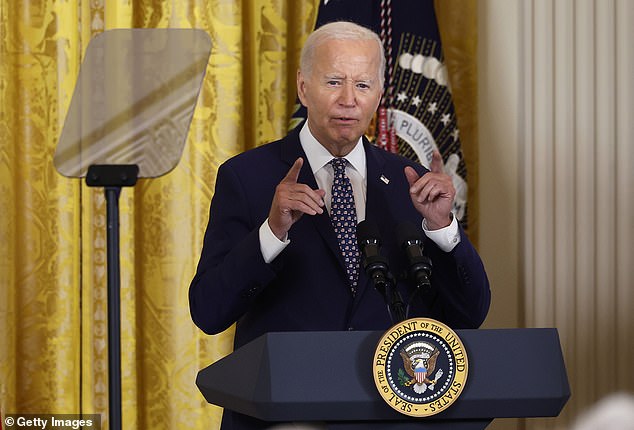Iranian hackers attempted to disrupt the presidential election by stealing confidential information from Donald Trump and offering the material to his rival Joe Biden’s campaign..
In August, Microsoft revealed that hackers linked to the Iranian government have been trying to influence the US presidential election for months.
On Wednesday, the FBI said cyberattackers sent unsolicited emails to people associated with the Democratic president in an attempt to interfere.
There is no evidence that any of the recipients responded, officials said, preventing the hacked information from coming to light in the final months of the close election.
Hackers sent emails in late June and early July to people associated with Biden’s campaign before he dropped out.
Iranian hackers tried to interest President Joe Biden’s campaign in information stolen from his rival Donald Trump’s campaign

On Wednesday, the FBI says cyber terrorists sent unsolicited emails about Donald Trump to people associated with the Democratic president in an effort to interfere
The emails “contained an excerpt taken from stolen, non-public materials from former President Trump’s campaign as text in the emails,” according to a statement from the FBI and several other federal agencies.
The announcement is the latest effort to denounce what officials say is Iran’s brazen and ongoing work to interfere in the 2024 election, including a hacking and leaking campaign that the FBI and other federal agencies last month linked to Tehran.
The Justice Department has been preparing charges for that violation.
The FBI, the Office of the Director of National Intelligence and the Cybersecurity and Infrastructure Security Agency have said the hack of the Trump campaign and an attempted breach of the Biden-Harris campaign are part of an effort to undermine voters’ faith in the election and stoke discord.
The Trump campaign revealed on August 10 that it had been hacked and said Iranian actors had stolen and distributed sensitive internal documents.
At least three media outlets – Politico, The New York Times and The Washington Post – received confidential material from the Trump campaign.
So far, each has refused to reveal details about what they received.
Politico reported that it began receiving emails on July 22 from an anonymous account. The source — an AOL email account identified only as “Robert” — relayed what appeared to be a dossier of research the campaign had apparently conducted on the Republican vice presidential nominee, the senator from Ohio. JD Vance.

In a statement, Morgan Finkelstein, a spokeswoman for Kamala Harris’ campaign, said the campaign has cooperated with law enforcement since it learned that people associated with the Biden team were among the recipients of the emails.

There is no evidence that any of the recipients responded, officials said, preventing the hacked information from coming to light in the final months of the close election.
The document was dated February 23, nearly five months before Trump chose Vance as his running mate.
In a statement, Morgan Finkelstein, a spokeswoman for Kamala Harris’ campaign, said the campaign has cooperated with law enforcement since it learned that people associated with the Biden team were among the recipients of the emails.
“We are not aware of any materials being sent directly to the campaign; some individuals were targeted with personal email messages that appeared to be spam or phishing attempts,” Finkelstein said.
Microsoft researchers revealed in August that they found several Iranian groups spreading polarizing messages and inflammatory posts on controversial and politically divisive topics.
According Microsoft’s latest threat intelligence reportCybercriminals have been using covert news sites that appeal to groups of voters from opposite ends of the political spectrum to further distance themselves from both sides.
One such site, created for Democratic Party supporters and called Nio Thinker, insults former President Donald Trump by calling him “an opioid pill-pumping elephant in the MAGA china shop” and a “delusional lunatic litigatorsaur.”
The website, which began publishing in late October 2023, also publishes numerous sarcastic and long-winded articles criticizing Trump.
On the other hand, another website called Savannah Time claims to be a “trusted source of conservative news in the vibrant city of Savannah.”

A website created for Democratic Party supporters called Nio Thinker insults former President Donald Trump by calling him an “opioid pill-pushing elephant in the MAGA china shop” and a “delusional, insane litigioussaur.”

The website, which began publishing in late October 2023, also publishes numerous sarcastic and long-winded articles criticizing Trump.
This website tends to focus heavily on Republican politics and LGBTQ issues, particularly gender reassignment, a highly controversial topic on the right.
Evidence uncovered by the company suggests that these sites have been using AI-enabled services to plagiarize some of their content from US publications.
Microsoft did not name the posts in its report. Notably, the report did not suggest that any attacks had been carried out against Vice President Kamala Harris.
Apart from this, the report also noted that an Iranian group connected to the Islamic Revolutionary Guard Corps had previously attempted to break into the email accounts of campaign officials.
Iranian groups that have historically sought to undermine confidence in the electoral system had been preparing to launch influence operations since March 2024, the researchers said.
The findings are the latest evidence that foreign governments are carrying out clandestine operations ahead of the US election in November.
In 2020, two Iranian men posed as members of the right-wing group Proud Boys as part of a voter intimidation effort, according to FBIThey were later charged for their involvement.
In the same election year, Iranian hackers breached a website used by a US municipal government to publish election results.
The attackers were caught before carrying out any nefarious activity, US cybersecurity officials later clarified.

